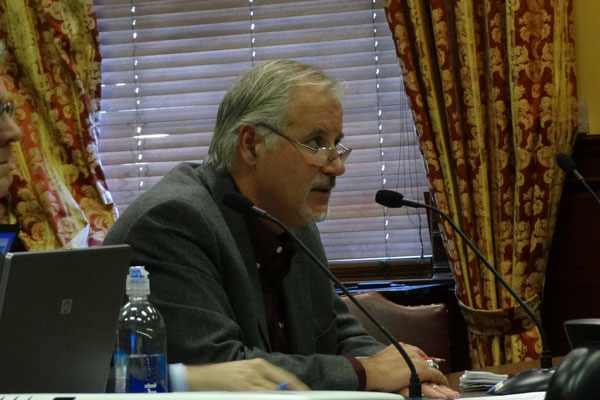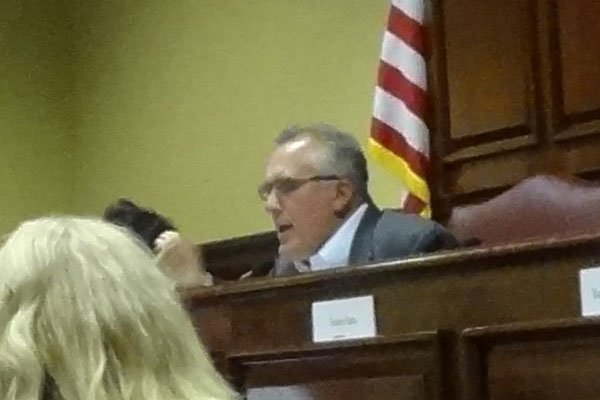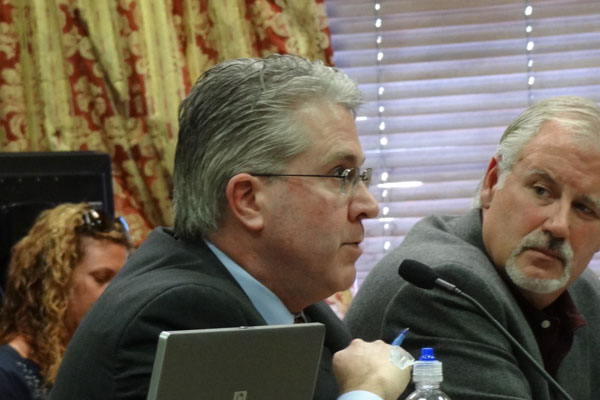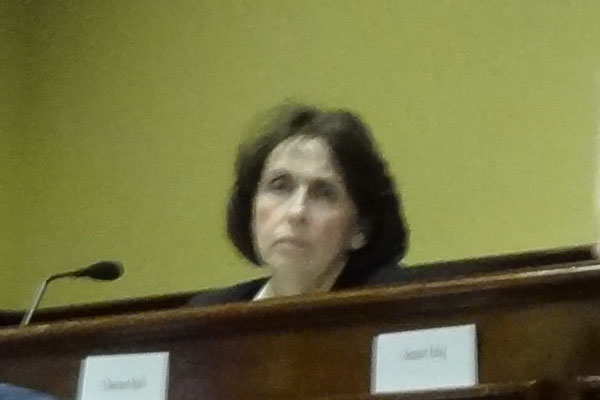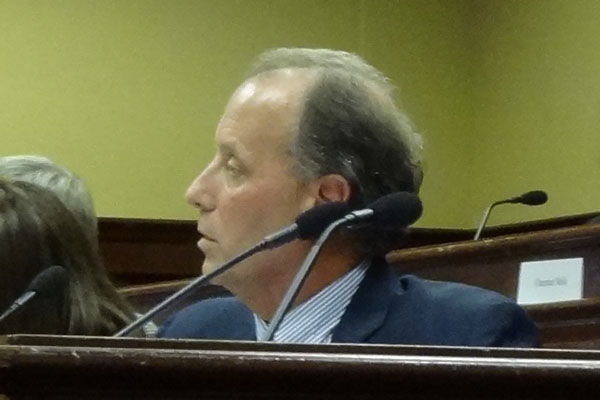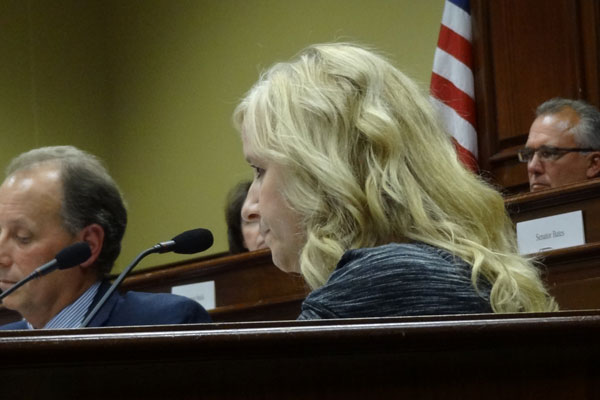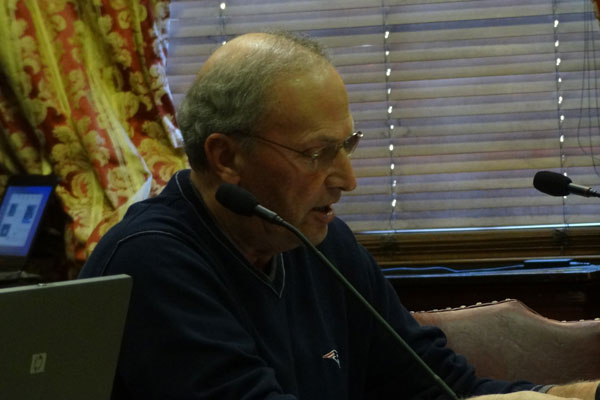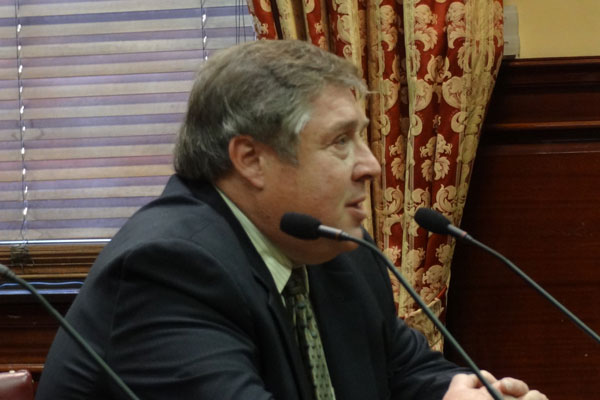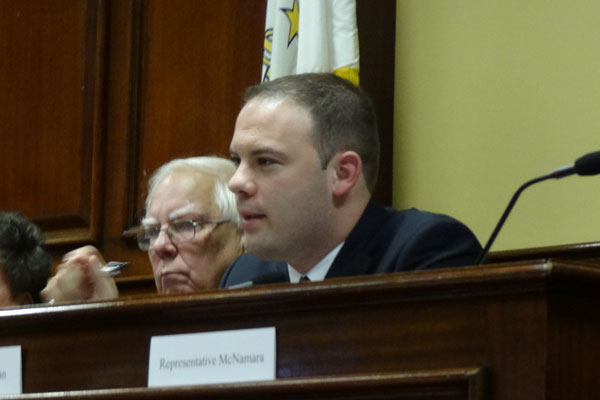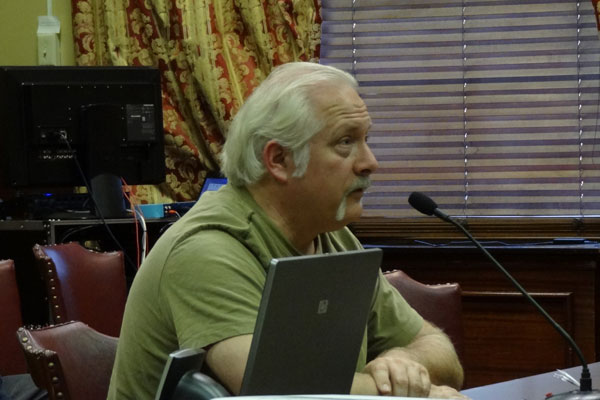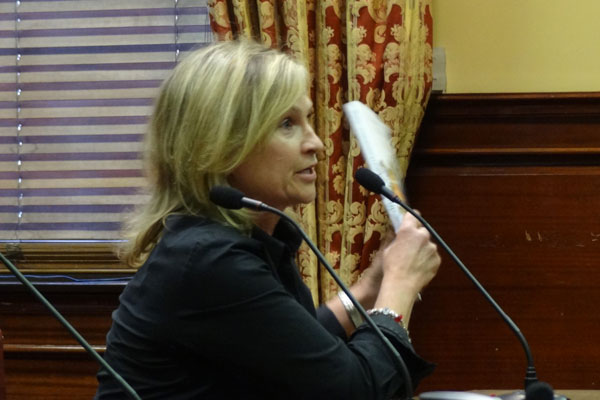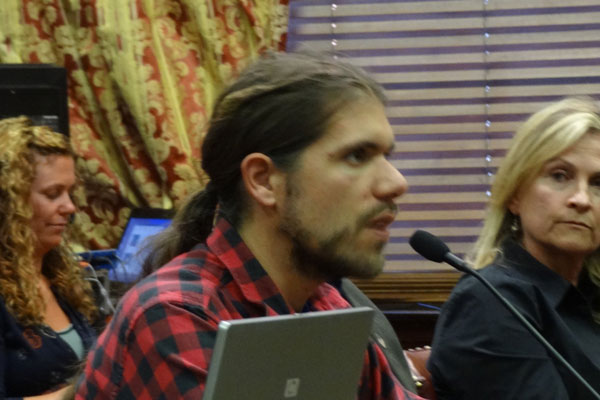10/21/13 – Sales Tax Commission
4:06 p.m.
Like a school classroom, today’s commission to study eliminating the sales tax has begun with a video — an ABC6 news report on Rhode Islanders crossing the line to Massachusetts to save money on sales tax and gas prices.
First up will be Paul Bachman from the Beacon Hill Institute and Mike Stenhouse from the RI Center for Freedom & Prosperity.
4:10 p.m.
Stenhouse opens by referring to the last hearing, to point out that the idea of eliminating the sales tax didn’t begin with the assumption that the sales tax is particularly bad or out of whack, in RI, as seemed to be the thrust of some of the members’ commentary last time. Rather, the sales tax is the one that, when eliminated, will have the largest and most rapid affect on Rhode Island’s employment level.
4:15 p.m.
Before running through the cascade of benefits that the Center expects from the sales tax elimination, Stenhouse suggested that the members of the commission should take this particular hearing to consider the issue without respect to the cost. First principles first: helping the folks whom the government is supposed to be serving.
4:20 p.m.
Stenhouse puts the 25,000 new jobs that the Center projects to be gained from eliminating the sales tax in the context of the 30,000+ businesses with sales tax licenses. Even before talking about new companies that would come into RI or the effect of the tax reduction on every other industry, if there were no sales tax, the existing retail businesses wouldn’t even have to average one new employee each to meet the projection.
4:21 p.m.
Rep. Jan Malik, chairman of the commission, pauses to welcome the Dream Builders, from Bryant University, who are going to be helping him with work on eliminating the sales tax. He promises to give them all As.
4:22 p.m.
Now Paul Bachman is up, saying he’s a director with Beacon Hill Institute at Suffolk University, which has been analyzing tax policy for twenty years.
4:25 p.m.
Bachman emphasizes that RI-STAMP (the modeling tool on which the projections are based) is a dynamic tool, meaning that it projects revenue including the effect that a policy would have on the economy, whereas a static model would simply subtract the full amount of the sales tax revenue. He also points out that 25,000 new jobs would only be a 6% increase in employment, so it’s not an unimaginable number.
4:28 p.m.
According to Bachman, most income brackets would see an increase in number, with one exception somewhere in the middle, which can largely be accounted for as folks’ moving up the ladder.
4:29 p.m.
Bachman talks about the “horizontal equity” of eliminating the sales tax, because it applies to all sectors equally.
The first question is from Rep. Patricia Morgan, who asks the time frame before the state sees the full benefits.
Bachman says the model “shocks” the economy with the whole thing in the first year, but comes to full equilibrium after five years. If pressed, he’d say one could figure a fifth of the benefit per year.
[Having worked with the model a bit, I’d say I’m a bit more optimistic than that.]
4:34 p.m.
Commission member George Tamer asks how the model deals with the idea that people will just feel better about Rhode Island, whether to live and work here or to shop here. Bachman says the model doesn’t address those sorts of intangible factors.
4:35 p.m.
Sen. Walter Felag asks how the $890 million in sales tax would be returned in other taxes.
Bachman says the model projects a 40% increase in consumption (both internally and bringing in money from out of state) and an increase of 13,000 new residents.
He emphasizes that the baseline for these numbers is “no tax change,” meaning that a recession or boom wouldn’t affect the adjustment, although it would change the experienced number. (That is, if the economy was about to lose 25,000 jobs, eliminating the sales tax would keep it even.)
4:40 p.m.
John Simmons from RIPEC is coming on very strong (interrupting Bachman’s answers and such), insisting that the model “solves” rather than “predicts.” I think they’re talking past each other in semantics. The model is actually based on economic research in academic literature predicting behavior which “solves” for the “equilibrium,” given Rhode Island’s current economic circumstances.
But it was a quite surprising interrogation.
4:46 p.m.
Paul Dion, director of Revenue Analysis, is asking about some of the specifics of the model and how it allocates the new money in the economy. “I’m an economist, so don’t be afraid to” speak in jargon.
4:51 p.m.
Dion is saying that his office has run similar models and gets very different results, although he hasn’t stated what the difference actually is.
4:55 p.m.
Dion asks what happens to government-sector jobs, and Bachman says they would go down for the equilibrium — about 6,000 in state and local government, although that all depends on how the state adjusts its spending.
5:00 p.m.
Dion and Bachman are going along the same vein. I think this exchange is mixing things up. The model makes assumptions about how the money will flow through the economy. That does not require the government to actually follow those assumptions.
For example, the model may predict a certain percentage cut in education aid in order to balance everything out, but the state could potentially make its cuts in a more economically efficient way (at the expense of services), or protect services to a reduction of the projected number of new jobs.
5:13 p.m.
Kate Brewster, from the Economic Progress Institute, asks what Stenhouse meant when he said that eliminating the sales tax had the greatest effect. He explains that the Center ran the model for all of the major taxes, and the sales tax had the greatest effect.
That would be different from state to state. RI’s small size and population density certainly have an effect on the relative impact of each tax on the economy.
5:19 p.m.
Vincent Bilotti, a registered pharmacist and present liquor-store owner in Central Falls, is now testifying that folks in his business and supply chain tell him that the sales tax, particularly on alcohol, has a huge effect. When Massachusetts imposed sales tax on its alcohol (creating parity with Rhode Island), his alcohol sales went up by a huge amount (just shy of doubling, if I heard right).
5:23 p.m.
He’s now saying that his children are both exiting the state of Rhode Island because there is no work here. Even he is looking at following his fellow pharmacists’ practice of selling their stores and moving to Florida.
5:25 p.m.
Paul Dion asks what sort of impact eliminating the sales tax on utilities would have on his business. Bilotti says it would help, but wouldn’t be huge.
5:27 p.m.
Ron Valequette and Mike Puyanna are now up to testify. Valequette is saying that eliminating the sales tax would increase the purchase power of the population hugely. He’s talking about the higher population in Connecticut and Massachusetts and suggesting that the effect flipping the flow of cross-border shopping would be quite high.
5:34 p.m.
He’s saying that Rhode Islanders are heavily burdened in their household budgets, so why, he asks, would businesses set up shop, here?
5:35 p.m
Sen. Ryan Pearson requests that Valequette send over a list of the regulations that are particularly onerous. He says he often asks for that, but rarely receives answers. [I’d offer that one of the problems RI faces is that the regulations are harmful all the way across. It piles up. If you want a list of the “most onerous,” open the book and look at them all.]
5:37 p.m.
Puyanna, from the RI Tea Party, is saying that the “underlying problem” in RI is the attitude to say, “we can’t do this, because…”
5:39 p.m.
“The idea that we simply can’t do this is defeatism.” Puyanna says this attitude is why the state is losing population.
5:41 p.m.
Eliminating the sales tax may be somewhat bold and “a little bit scary,” he says, but it would send the message that Rhode Island is looking to do something different.
5:42 p.m.
Susan Wynne, also of the RI Tea Party, is saying that she’s not an economist, but a parent, and she’s pointing out the high cost of books. Two books generated about $20 in taxes.
5:44 p.m.
Will Grapentine says he’s a third-generation Rhode Islander and a Millennial, and he says he typically does his shopping in other states.
[No commission members have pointed out that those who shop in other states are breaking the law if they don’t pay the use tax in the amount of their savings.]
5:47 p.m.
Todd Giroux is testifying as a candidate for governor. He says he’s going to offer a lot in business loans and property tax relief. But he says this one piece of legislation, the sales tax elimination, can “gain regional competitiveness.”
5:49 p.m.
He’s interested in the “psychographics of the matter,” meaning that a large change will have a better effect on attitude than would slight reductions, such as the folks who want to fine-tune policy tend to suggest.
5:51 p.m.
Lee Anne Sennick says her neighborhood recently loss its Stop & Shop, so they’re all going across the border for groceries, and all the license plates in the lot are from Rhode Island. Her daughter is going to college in New Hampshire and does not plan to return to Rhode Island when she graduates.
Eliminating the sales tax, she says, would be a beginning to a change in policies to give our children something to come home to.
5:54 p.m.
The final person testifying is Jim McGwin, whose family moved to RI in 1840.
He says he’s started five companies in Rhode Island, one of which was a medical device company that Johnson & Johnson bought out. The moment they bought it, they moved the business out of Rhode Island because it simply didn’t make sense to keep it here.
“There’s no opportunity for the young people who are supposed to be paying for the pension overhaul and the taxes of the future.” He says the State House is one of four buildings with a marble dome because the state was once was an economic dynamo, and now it’s collapsing.
6:00 p.m.
He says the only thing keeping people in Rhode Island is family, and when his mother in law and mother are no longer around, he’ll have no reason to stay. So, the state is losing the young, the old, and folks in between, who have no opportunity.
He says RI could be a shopping destination for New York City and other high-population centers.
“Right now, Rhode Island doesn’t believe that it can win, and we have to change that.”
6:02 p.m.
McGwin calls for Paul Bachman and Paul Dion to get their technical people in a room and work out the differences of the model.
That actually suggests an important point. Whatever difference there may be would mainly be of importance in determining how the state adjusts its budget to prepare, not in whether to make the change.


